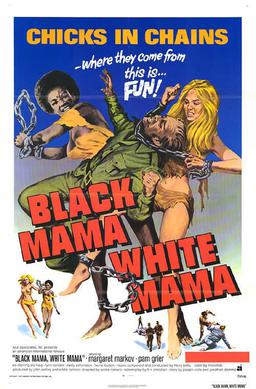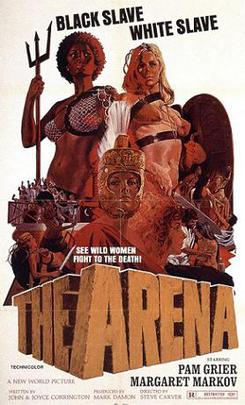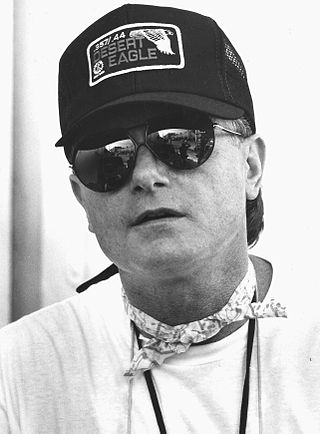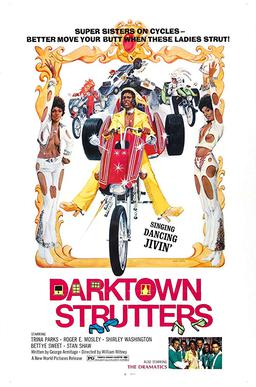
Get Carter is a 1971 British gangster film, written and directed by Mike Hodges in his directorial debut and starring Michael Caine, Ian Hendry, John Osborne, Britt Ekland and Bryan Mosley. Based on Ted Lewis's 1970 novel Jack's Return Home, the film follows the eponymous Jack Carter (Caine), a London gangster who returns to his hometown in North East England to learn about his brother's supposedly accidental death. Suspecting foul play, and with vengeance on his mind, he investigates and interrogates, regaining a feel for the city and its hardened-criminal element.

American International Pictures is an American motion picture production label of Metro-Goldwyn-Mayer. In its original operating period, AIP was an independent film production and distribution company known for producing and releasing films from 1955 until 1980, a year after its acquisition by Filmways in 1979.

Jackie Brown is a 1997 American crime film written and directed by Quentin Tarantino, based on Elmore Leonard's 1992 novel Rum Punch. It stars Pam Grier as Jackie Brown, a flight attendant who is caught smuggling money. Samuel L. Jackson, Robert Forster, Bridget Fonda, Michael Keaton, and Robert De Niro appear in supporting roles.

Pamela Suzette Grier is an American actress and singer. Described by Quentin Tarantino as cinema's first female action star, she achieved fame for her starring roles in a string of 1970s action, blaxploitation and women in prison films for American International Pictures and New World Pictures. Her accolades include nominations for an Emmy Award, a Golden Globe Award, a Screen Actors Guild Award, a Satellite Award and a Saturn Award.

Foxy Brown is a 1974 American blaxploitation film written and directed by Jack Hill. It stars Pam Grier as the title character who takes on a gang of drug dealers who murdered her boyfriend. The film was released by American International Pictures as a double feature with Truck Turner. The film uses Afrocentric references in clothing and hair. Grier starred in six blaxploitation films for American International Pictures.

I'm Gonna Git You Sucka is a 1988 American blaxploitation parody film written, directed by and starring Keenen Ivory Wayans in his directorial debut. Featured in the film are several noteworthy African-American actors who were part of the genre of blaxploitation: Jim Brown, Bernie Casey, Antonio Fargas and Isaac Hayes. It co-stars John Vernon, Kadeem Hardison, Ja'net Dubois, John Witherspoon, Damon Wayans, Clarence Williams III and Chris Rock, and acts as the film debuts of comedian Robin Harris and brothers Shawn and Marlon Wayans.

Coffy is a 1973 American blaxploitation film written and directed by Jack Hill. The story is about a black female vigilante played by Pam Grier who seeks violent revenge against a heroin dealer responsible for her sister's addiction.

Sheba, Baby is a 1975 American blaxploitation action film directed by William Girdler and starring Pam Grier and Austin Stoker.

Ted Lewis was a British writer known for his crime fiction.

Black Mama White Mama, also known as Women in Chains, Hot, Hard and Mean and Chained Women, is a 1973 women in prison film directed by Eddie Romero and starring Pam Grier and Margaret Markov. The film has elements of blaxploitation.

The Arena, also known as Naked Warriors, is a 1974 gladiator exploitation film directed by Steve Carver and starring Margaret Markov and Pam Grier. Joe D'Amato, the film's cinematographer, has stated that he took over direction of the fight scenes in the film.

Scream Blacula Scream is a 1973 American blaxploitation vampire horror film. It is a sequel to the 1972 film Blacula. The film was produced by American International Pictures (AIP) and Power Productions. This was the acting debut of Richard Lawson.

Women in Cages is a 1971 women in prison sexploitation film directed by Gerardo de León and starring Jennifer Gan, Judy Brown, Roberta Collins, and Pam Grier. Co-produced by Roger Corman, it was prominently featured in the Planet Terror portion of the 2007 film Grindhouse. Grindhouse director Quentin Tarantino said of the film, "I'm a huge, huge fan of Gerry de Leon.... the film is just harsh, harsh, harsh." He described the final shot as one of "devastating despair".

George Brendan Armitage is an American film director, screenwriter and producer. He directed the films Miami Blues (1990) and Grosse Pointe Blank (1997). He worked frequently with Roger Corman.

Friday Foster is a 1975 American blaxploitation film written and directed by Arthur Marks and starring Pam Grier in the title role. Yaphet Kotto, Eartha Kitt, Scatman Crothers and Carl Weathers co-starred. It is an adaptation of the 1970-74 syndicated newspaper comic strip of the same name, scripted by Jim Lawrence and illustrated by Jorge Longarón. This was Grier's final film with American International Pictures. The tagline on the film's poster is "Wham! Bam! Here comes Pam!"

Blaxploitation is an ethnic subgenre of the exploitation film that emerged in the United States during the early 1970s. The term, a portmanteau of the words "black" and "exploitation", was coined in August 1972 by Junius Griffin, the president of the Beverly Hills–Hollywood NAACP branch. He claimed the genre was "proliferating offenses" to the black community in its perpetuation of stereotypes often involved in crime. The genre does rank among the first after the race films in the 1940s and 1960s in which black characters and communities are the protagonists and subjects of film and television, rather than sidekicks, antagonists or victims of brutality. The genre's inception coincides with the rethinking of race relations in the 1970s.

Private Duty Nurses is a 1971 American film written and directed by George Armitage. It is a sequel to The Student Nurses (1970) for New World Pictures. Roger Corman says they got the idea for the title after being sent a letter of complaint about the first film from the Private Duty Nurses Association.

Darktown Strutters is a 1975 blaxploitation musical comedy film from New World Pictures. Despite having mixed reviews at the time it has gained cult status over the years with praise from film director Quentin Tarantino. Tarantino called it "a ridiculous satire".

The Twilight People is a 1972 Filipino-American horror film directed by Eddie Romero. It was produced by Romero and John Ashley, and written by Romero and Jerome Small. It stars Ashley and features, in an early film appearance, Pam Grier in a supporting role.

Cool Breeze is a 1972 American blaxploitation heist film directed by Barry Pollack and starring Thalmus Rasulala. It was released by Metro-Goldwyn-Mayer. The film is loosely based on W. R. Burnett's 1949 novel The Asphalt Jungle. It is the fourth film adaptation of the novel, after The Asphalt Jungle (1950), The Badlanders (1958) and Cairo (1963). The film was released with the tagline: "He hit the Man for $3 million. Right where it hurts. In the diamonds. And baby, that's cold."




















